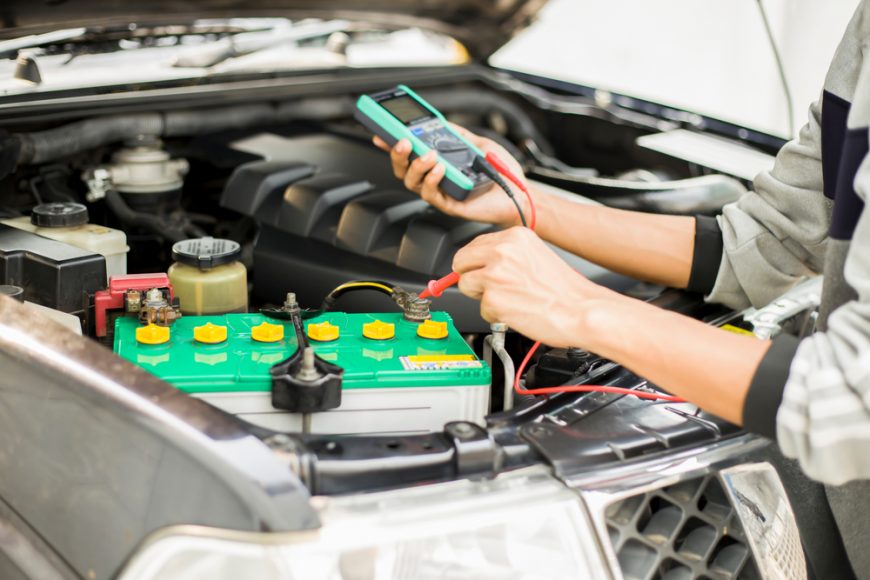- June 30, 2021
- By Park Muffler
- In Blog, Vehicle Batteries
Troubleshooting Electrical Issues With Your Car

Although your vehicle depends on oil and gas to get going, it also relies on an electrical system that does everything from run your lights to getting your engine started.
All the parts of your car work together to keep you moving – when one system fails to operate, it affects the performance of your entire car.
Which can often make it difficult to determine what the main cause of your issue is!
However, if you suspect that your car is experiencing electrical problems, there are steps you can take to troubleshoot the issue.
Here are some troubleshooting steps to help you figure out what is going on with your vehicle:
Troubleshooting Steps for Electrical Issues
The most common cause of electrical issues with cars is the battery.
However, this system is intricate and there could be other culprits causing an electrical hassle with your vehicle!
1. Check For Blown Fuses
When a fuse blows in your car, it usually causes minor issues such as loss of interior lights, radion, turn signals or some climate control features. However, a blown fuse can prevent your car from starting in some cases.
In order to see if your car has a blown fuse, begin by turning off your car and locating the fuse box (check your owner manual to see where it is).
Using a pair of needle nose pliers, firmly remove the fuse in question (using the diagram) and look at the wiring on the side. If the wiring looks disconnected or damaged, the fuse is likely blown.
If you find yourself constantly replacing blown fuses, there could be an issue where the electrical system in your vehicle is sending too muc current through those fuses. Your best course of action is to have a licensed technician look into the issue.
2. Dimmed Interior Lights
When there is a problem with your car’s electrical system, you may notice interior lights dimming as you drive. This is a sign that your alternator or battery may be failing.
To find out which it is, attach a multimeter to the battery terminal while the car is running. If the voltage is reading low, it could mean that your alternator needs to be replaced.
This is a job that needs to be done as soon as possible. Ignoring a failing alternator may lead to damage to your battery or getting stranded with an inoperable vehicle.
3. Check For Burning Smells
If you notice the smell of melting or burning plastic, this can be an indication that your wiring has shorted out and is heating up to the point of melting the insulation around it. Ignoring this issue can lead to your car bursting into flame, even as you’re driving it.
This is because loose or shorted wires can cause fires. Loose electrical connection create a higher resistance, making it more difficult for the current to flow through the circuit. This leads to extreme heat, melted insulation, melted wires and, if left unchecked, fire.
Should you notice a smell like this, or smoke coming from your car, stop driving immediately and have your vehicle serviced.
4. Listen to Your Engine
When you turn your key, your engine should roar beautifully to life. However, if you notice that the engine struggles to crank, or sputters, there may be an electrical issue wit your car.
Your engine needs electricity to ignite the spark plugs and start. When the flow of electricity is weak, your engine will struggle to start or may not start at all.
If the spark plugs aren’t getting enough juice, you may notice your engine sputtering since the fuel can’t combust fully in the cylinders.
So engine noises may reveal three potential issues: the starter, the battery or the spark plugs.
You can easily test your battery for voltage and you can also inspect your spark plugs by using a spark plug tester. Otherwise, take a look at the tip and sides of the electrode of your spark plug – if there’s a lot of black buildup, it may need to be changed.
5. Inspect the Battery
We’ve already talked about how your battery could be the culprit when it comes to electrical issues with your car, but nines times out of ten this is the issue.
Pop your hood and take a look at the battery. While you can run a voltage test, it’s also important to inspect the condition of your battery.
If the terminals have white gunk, rust or other debris on them, they need to be cleaned thoroughly with a wire brush. Corrosion can have a negative effect of your vehicle’s electrical system.
If cleaning the battery or boosting it doesn’t work, check for any loose wires or connections.
Should you still experience issues with your battery, you can always bring your vehicle to Park Muffler and our team of expert technicians will inspect it and service it if necessary.
6. Check the Alternator Belt
We’ve talked about alternators too, but let’s look at how you can check your alternator belt to troubleshoot electrical issues with your car.
The alternator actively charges your battery as you drive and the belt wraps around a pulley on the alternator and connects to the crankshaft.
With the hood popped, locate your alternator belt (this is sometimes also known as a serpentine belt). It is usually at the front of the engine and has a soft surface on the ribbed side.
If you’re belt is wearing out, the rubber will appear hard and cracked. It may also stretch and lose tension. These are signs tat your alternator belt needs to be replaced.
Failing to do so can lead to damage to your alternator.
Peace of Mind
A vehicle’s electrical issues should never be brushed aside or ignored! If you suspect there is something wrong with your car’s electrical system, you should have it inspected and serviced right away.
Our knowledgeable and trained technicians at Park Muffler and ready and available to help you with all of your electrical and service needs.
© Park Muffler - All Rights Reserved.


